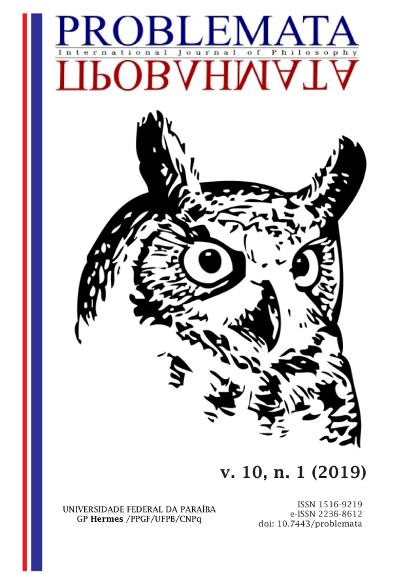PHILOSOPHY BEYOND EUROCENTRISM: AN APPROACH AT AFROPERSPECTIVISM IN TEACHING PHILOSOPHY
DOI:
https://doi.org/10.7443/problemata.v10i1.46177Keywords:
Africa. Afroperspectivismo. Diversity. Teaching philosophy. Eurocentrism.Abstract
The objective of this essay is to awaken in the philosophy teacher the perception of the need to deconstruct crystallized teaching ideas, predominantly a history of Eurocentric philosophy, without opportunities to thought exercise considering its own dynamicity. This leads to the search for the conception of a philosophy teaching open to the thought of diversity, so that all cultures are considered as equal in their rational capacity, be they African, Greek, Chinese, Indian, Latin and many other potential holders of philosophies and meanings. In this context, is presented the concept of Afropperspectivism developed in Brazil, particularly by the philosopher Renato Nogueira as a proposal to overcome the exclusionary concept of life and teaching, a result of the thought colonization. In order to achieve this goal, the reading and interchange with texts of African philosophers and some of its commentators is used. Among the first ones stand out FANON (2008), ORUKA (2002) and TOWA (2015); among the latter, DANTAS (2014, 2018), FLOWER OF BIRTH; BOTELHO (2010), GOMES (2014), JESUS; NEGRI; CANDIDO (s/d), NOGUERA (2011, 2014), OLIVEIRA (2012), TOMAZETTI; BENETTI (2012). Also relevant debate is established with Latin American philosophers and philosophers, especially regarding the teaching of philosophy from a diversity perspective. Among these, we mention ASPIS; GALLO (2009) and CERLETTI (2009). The result of these multiple readings and interlocutions is the clarification of positions, values and practices that think philosophy and philosophy teaching taking into account the diversity of cultures, knowledge and thinking, recognizing new epistemic territories that are outside the logic of Eurocentrism . Particularly Afropperspectivism is open, inclusive, dialogical, full of potential as a way of thinking, or as a starting point for the teaching of philosophy. This essay concludes by pointing to the possibility of constructing the teaching of philosophy from the perspective of the thought of diversity in general and of African philosophy in particular; not as a negation of European thought, but as recognition that there is philosophical, authentic and autochthonous thinking that transcends European rationality.
Downloads
References
ASPIS, Renata Lima; GALLO, Silvio. Ensinar filosofia: um livro para professores. São Paulo: Atta Mídia e educação, 2009.
CERLETTI, Alejandro. O ensino de filosofia como problema filosófico. Belo Horizonte: Autêntica, 2009.
DANTAS, Luis Thiago Freire. Filosofia desde África: perspectivas descoloniais. 2018. 230 f. Tese (Doutorado em Filosofia) – Setor de Ciências Humanas da Universidade Federal do Paraná, Curitiba, 2018.
______. O ensino da filosofia africana nas Diretrizes Curriculares do Paraná: impedimentos epistêmicos? InterMeio: revista do Programa de Pós-Graduação em Educação-UFMS, Campo Grande, v. 20, n. 40, p. 58-80, jul./dez. 2014.
DELEUZE, Gilles; GUATTARI, Félix. O que é a filosofia? Tradução de Bento Prado Jr. e Alberto Alonso Munoz. São Paulo: 34, 2010.
FANON, Frantz. Pele negra, máscaras brancas. Tradução de Renato da Silveira. Salvador: EDUFBA, 2008.
FLOR DO NASCIMENTO, Wanderson; BOTELHO, Denise. Colonialidade e educação: o currículo de filosofia brasileiro entre discursos coloniais. Revista Sul-Americana de Filosofia e Educação, Brasília, n. 14, p. 66-89, mai.-out. 2010.
GOMES, Isabel Maria Jorge. Odera Oruka: o sábio e o filósofo. In: SEMINÁRIO CONHECIMENTOS, SUSTENTABILIDADE E JUSTIÇA COGNITIVA, 2013-14, Coimbra. Trabalho... Coimbra: Faculdade de Economia da Universidade de Coimbra, 2014. Disponível em: <http://alice.ces.uc.pt/en/wp-content/uploads/2014/03/Odera-Oruka-Isabel.pdf>. Acesso em: 28 de março de 2019.
HEIDEGGER, Martin. Introdução à filosofia. Tradução de Marcos Antônio Casanova. São Paulo: Martins Fontes, 2009.
JESUS, Rodrigo Marcos; NEGRI, Edson; CANDIDO, Juarid. Filosofia e consciência negra: desconstruindo o racismo. Cuiabá: PIBID Filosofia UFMT, s/d.
NOGUERA, Renato. O Ensino de Filosofia e a Lei 10.639. Rio de Janeiro: Pallas: Biblioteca Nacional, 2014.
______. Denegrindo a filosofia: o pensamento como coreografia de conceitos afroperspectivistas. Griot: Revista de Filosofia, Amargosa (BA), v. 4, n. 2, p. 1-19, dez. 2011.
OLIVEIRA, Eduardo David de. Filosofia da ancestralidade como filosofia africana: educação e cultura afro-brasileira. Revista Sul-Americana de Filosofia e Educação, Brasília, n. 18, p. 28-47, mai.-out. 2012.
ORUKA, H. Odera. Quatro tendências da atual Filosofia Africana. Tradução de Sally Barcelos Melo para uso didático de ORUKA, H. Odera. Four trends in current African philosophy. In: COETZEE, Peter H.; ROUX, Abraham P.J. (eds). The African Philosophy Reader. New York: Routledge, 2002. p. 120-124.
_____. Sage philosophy: Indigenous thinkers and modern debate on African philosophy. Brill, 1990.
RAMOSE, Mogobe. Sobre a Legitimidade e o Estudo da Filosofia Africana. Ensaios Filosóficos,
Volume IV – Outubro / 2011.
RANCIÉRE, Jacques. O mestre ignorante – cinco lições sobre a emancipação intelectual. Tradução de Lilian do Valle. 2. ed. Belo Horizonte: Autêntica, 2007.
TOMAZETTI, Elisate M.; BENETTI, Cláudia Cisiane. Formação do professor de filosofia entre o ensino e a aprendizagem. Revista Diálogo Educação, Curitiba, v. 12, n. 37, p. 1027-1043, set.-dez. 2012.
TOWA, Marcien. A ideia de uma filosofia negro-africana. Tradução de Roberto Jardim da Silva. Belo Horizonte: Nandyala; Curitiba: NEAB-UFPR, 2015.
Downloads
Published
Issue
Section
License
Authors who publish with this journal agree to the following terms:
- Authors retain copyright and grant the journal right of first publication with the work simultaneously licensed under a Creative Commons Attribution License that allows others to share the work with an acknowledgement of the work's authorship and initial publication in this journal.
- Authors are able to enter into separate, additional contractual arrangements for the non-exclusive distribution of the journal's published version of the work (e.g., post it to an institutional repository or publish it in a book), with an acknowledgement of its initial publication in this journal.
-
- Authors are permitted and encouraged to post their work online (e.g., in institutional repositories or on their website) prior to and during the submission process, as it can lead to productive exchanges, as well as earlier and greater citation of published work (See The Effect of Open Access).





